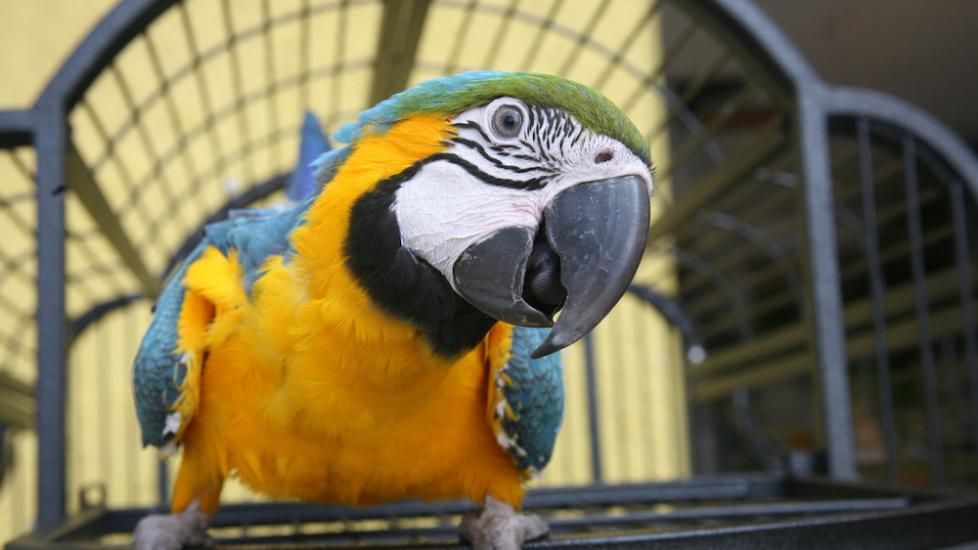How Long Do Parrots Live?
iStock/ngirish
Parrots may live anywhere from 15 to over 50 years depending on their unique species and level of care. Because the average parrot lifespan requires a lifelong human commitment, lawyers often urge pet parents to provide documented plans for their parrots in their wills.
So, how long do parrots live, exactly? And why do they live so long?
Key Takeaways
- Small parrots generally live 8–15 years, while large parrots can live 25–50 years or more.
- Parrots are incredibly smart and typically very healthy animals when cared for properly.
- The most important factor for parrot longevity is overall care, including proper diet.
- Parrots need a lot of attention and bird toys to live a long, mentally stimulated life.
Average Parrot Lifespan and Aging
In general, the smaller the bird, the shorter their lifespan. Smaller birds, like budgies, parakeets, and cockatiels, generally only live 8–15 years. Larger birds, like macaws and grey parrots, can live 25–50 years.
Parrots are an incredibly diverse group of birds known by their scientific name—psittacines. There are over 350 different types of psittacine birds, some of the more common including:
-
Large hookbill parrots (macaws, African grey parrots)
The oldest known parrot was a blue-and-gold macaw named Charlie, who was at least 114 years old at the time of their death. While Charlie was truly an anomaly, birds reaching advanced ages may be possible if the parrot receives great care, has good genes, and a bit of good luck.
Typically, parrots don’t live as long—even half of the time—in the wild as in captivity. This shortened lifespan is primarily due to predators, competition, and no access to veterinary care.
Parrot Life Stages
Every parrot species will mature and develop at different rates.
Generally, parrots lay anywhere between two to eight eggs that will incubate for two to four weeks before hatching. The chicks hatch with little or no downy feathers, with their eyes closed. They are highly vulnerable at this stage, requiring significant care from their parrot parents.
Smaller parrots become sexually mature as early as six months, while larger species can take up to six years.
What Factors Affect a Parrot’s Lifespan?
Parrot species are primarily tree-dwelling birds originating from tropical and subtropical regions. While each species has slightly different nutrition and overall health requirements, they all have the general needs of a balanced diet, exercise and habitat space, and mental stimulation.
Parrots have high metabolisms but do not burn as many calories as their wild counterparts, who must forage for food and fly often. So, obesity and nutrient deficiency diseases are common in pet parrots. These problems are usually secondary to poor nutrition and insufficient exercise.
Parrots should never be fed exclusive seed diets. This type of diet lacks vitamins and calcium crucial for healthy parrots.
Work with your veterinarian to determine the best diet (often formulated pellets) to provide a balanced diet.
Signs of a Healthy Parrot
A healthy parrot is bright and alert. The parrot’s body is clean, with smooth, shiny feathers, free of lumps or scaling. They should be free from any eye or nose discharge
If your parrot has eye or nasal discharge this could mean they may be suffering from any of the following:
-
Vitamin A deficiency
-
Sinus infection
-
Chlamydia
-
Aspergillosis
-
Toxin exposure such as tobacco
If your parrot is showing any abnormal signs, get them checked out at your local veterinarian right away.
In addition to nutrition and health conditions, mental health is another major factor contributing to a parrot longevity. Lack of proper stimulation can lead to abnormal behaviors such as feather plucking, loss of appetite, and increased vocalization.
Consult a veterinary professional familiar with parrots if you notice any concerning behaviors.
How To Improve Your Parrot's Life Expectancy
While species, size, and genes all play a role in the longevity of a pet parrot, malnutrition and poor husbandry are the leading causes of a shortened lifespan.
Improving care, including providing a balanced diet, is the best way to increase a parrot's lifespan.
Always follow a veterinarian's recommendations to improve a parrot’s lifespan, this often includes:
-
Avoiding seed-based diets.
-
Offering a balanced formulated pellet diet (80% of diet).
-
Scheduling regular veterinary appointments, including blood work
-
Providing cages as large as possible, which allow parrots to stretch their wings fully
-
When a parrot free roams the house, be aware of all potential hazards, including:
-
Windows
-
Open doors
-
Other pets
-
Stovetops
-
Dangerous foods
-
Toxic fumes from cooking or smoking
-
-
Providing numerous toys, perches, and chews in the cage for mental stimulation
-
Providing interaction, training, and enrichment as often as possible to help bond with the parrot as well as decrease abnormal behaviors, most notably feather plucking
-
Providing 10–12 hours of sleep in a dark room each night
Parrot Lifespan FAQs
How long do parrots live in captivity?
The life expectancy of parrots in captivity is 8–15 years, while large parrots can live 25–50 years or longer.
Why do parrots live so long?
Parrots are very smart and have efficient metabolisms. As pets, they have no predators to threaten them.
How old is the oldest living parrot?
The longest living parrot was named Charlie, who lived to 114 years old.
References
Eatwell BVSc(Hons), DZooMed(Reptilian), DECZM(Herp), MRCVS, Kevin. British Small Animal Congress 2011: Pet Birds. 2011.
Mcleod DVM, Lianne. The Spruce Pets. How Long do Pet Parrots and Other Birds Live?. 2023.
Guinness World Records. Oldest Parrot Ever.
Johnson DVM, Dan. Atlantic Coast Veterinary Conference 2006: Psittacine Quick Fact and Common Disorders. 2006.
Leck DVM, Dipl ABVP (Canine and Feline Practice), Susan. A Quick Reference Guid to Unique Pet Species: Pionus Parrots Pet Care. 2011.
Pollock DVM, DABVP (Avian Practice), Christal. Lafeber Vet. Parrot Anatomy Basics. 2023.
